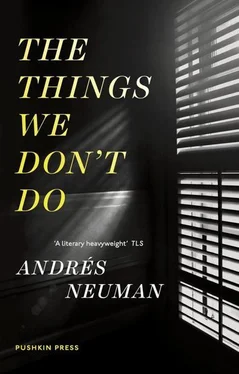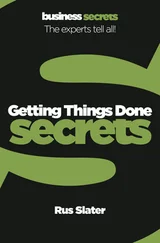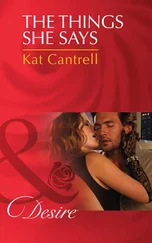From then on, the orders intensified. The notes never contained an explicit threat or any mention of the reprisals that would be taken if I did not comply. Rather than reassure me, this alarmed me still further: the subversives must be very sure of their strength to know I would obey. The fact is that the instructions could be very odd (“At midnight, put your dirty laundry in the lift”; “When you go out, make sure you leave the television switched to Channel 11”; “If the phone rings three times, don’t answer”; “Look out of the window at 18.47”; “Turn all the taps on at once”), and yet they did not prevent me from carrying out my activities as if nothing was happening. At first I felt humiliated. But eventually I got used to it.
The more orders I have obeyed, the more numerous the demands. Each note now contains two, three, or even four tasks, sometimes interconnected, although never impossible to fulfil. Everything else is under control. My position appears safe, my family is undisturbed. But N.N.’s messages pursue me in every city, every hotel, just before I tear out the page, add my signature, thank the staff, have my photo taken with them and go up to my room to toss and turn in my bed, open and shut my eyes to see always the same darkness, listen to the hum of the air-conditioning that inevitably reminds me of an aeroplane engine, consider that perhaps, before I manage to fall asleep, I could do with a glass of Napoleon Grande Reserve.
END AND BEGINNING OF LEXIS
AS HE DID every morning when the weather was fine, not very late (because he was hungry), nor very early (because he liked to sleep), Piotr Czerny went out for a walk. He caught a glimpse of himself leaving the front entrance to his home in a looking glass being carried by two uniformed young lads. The looking glass continued on its way, and Piotr Czerny was tempted to invent an aphorism concerning the paradox that a transparent object could be the worst obstacle. He denied himself that pleasure until after his espresso.
His portentous stomach swaying from side to side, Piotr Czerny gratefully inhaled the breeze the morning offered him. He walked several blocks down his street, then turned right towards Jabetzka Square. There he came across two birds disputing the same crumb of bread, and, a little farther on, a pair of truanting students disputing each other’s mouth. He came to a halt to catch his breath, stroked his moustache and since he was there, spied on the two teenagers. A simple, effective verse he could use to portray both lovers and birds leapt into his mind; he considered it for a moment, only to reject it. He walked on, and almost immediately Piotr Czerny saw himself pushing open the glass doors of the Central Café II.
He ordered an espresso, and the waiter soon brought it, together with two sachets of sugar and a glass of water: Piotr Czerny always asked for his water in a wine glass. After sipping the coffee, he opened his leather-bound notebook and took out his Mont Blanc. He waited until a slight tremor gave the starting signal. He immediately began to write in his minuscule handwriting. After a while he looked up from the page and put down his pen. He drank the glass of water in one long gulp, and managed a delicate belch, shielding his lips and moustache with two fingers. He mentally went through the poems he had written over the previous year. He was torn between two titles, but could not make up his mind: one, which had come to him unheeded as he was starting to write but still did not quite convince him, was The Absolution; the other, more hermetic and which he somehow preferred, was Flower and Stone. In any event, he had already filled two notebooks. If he continued at this rate, he would have the whole book ready by early summer. Since he did not like the idea of having to go over the poems during the summer months when the weather was at its hottest, he decided he would dedicate himself exclusively to aphorisms until the August inferno had abated. Calling over the waiter, he paid him with two coins. Keep the change, young man, he said as he always did, and the waiter gave the usual nod. As he walked wearily towards the exit, Piotr Czerny glanced out of the corner of his eye at the spotted surface of the oval mirror presiding over the Central Café II. He instantly felt a rush of consternation. Turning round, he looked for a free table. He sat down and used his Mont Blanc to write in his notebook: What we cannot see is what gets in our way. Contented, he put the notebook away, and let himself be swept along by the friendly current shuffling the lime tree leaves on the pavement like a deck of cards.
He did not have much money left. They rarely paid him on time for the reviews he wrote in the magazine. As for that vampire Zubrodjo, he had lost all hope he would pay him what he had promised. To be an editor, thought Piotr Czerny, you needed two basic qualities: a great vocation and little shame. But he had a secret that consoled him for all the rest: up his sleeve he had quantities of quarto-sized laid paper, filled with his minute, meticulous handwriting. Two books of poems, plus a possible memoir. Perhaps later on there would also be a small collection of aphorisms. He would give them to Zubrodjo, of course. Glancing down at his fob watch, Piotr Czerny saw that it was still early, and allowed himself a stroll down by the river before returning home. He peered over the edge of the bridge: the water was churning, creating and dissolving glittering patterns. He walked away from the centre, in search of silence. All of a sudden he imagined the sounds as huge rings with a stark white centre. Silence, he told himself, must be only at the edges, defining the circumference, as fine as it was intangible: you can go through it from the outside or glimpse it from inside, but you can never dwell in it. Piotr Czerny could not be bothered to look for a bench and open his notebook, so he set aside the image until he was comfortably back at home. He concentrated on the cascading water, letting himself be carried along by the inertia of his stroll and a delicious lack of any thoughts.
As he turned the corner into his own street, he noticed something strange in the atmosphere. An unusual number of passers-by were rushing noisily down the street. Feeling too tired to quicken his pace, he tried to sharpen his eyes as he drew near to his building. He soon made out a crowd of people jostling each other on the far pavement, and a red vehicle obstructing the traffic. He realized that the distant siren he had been absent-mindedly hearing for some time belonged to the firemen’s truck pulled up outside his home. Making a painful effort, Piotr Czerny ran the fifty metres that separated him from his block of flats until, seriously out of breath, he was restrained by several policemen, who asked him if he was a resident in the building. Unable to respond, at that moment he saw the porter emerge from the crowd and throw himself on him, shouting wild-eyed: Mr Czerny! Mr Czerny, it’s a disaster! half the building up in flames! if only the firemen had arrived sooner, if only the residents were more careful…! Half the building? Piotr Czerny interrupted him, up to which floor? The porter looked down at the ground, wiped the sweat from his brow and said: Up to the third. Piotr Czerny could barely make out his voice above the uproar; it seemed to him like a distant memory. It looks like the fire started on the first floor, explained the porter, but it had reached the fourth floor before the firemen could bring it under control. Mr Czerny, I’m so sorry, so sorry…! Piotr Czerny felt as if a scimitar had sliced straight through his stomach. Looking up, he saw six balconies, as black as if they had been covered in pitch. It seemed to him his head was whirling. He said: All right, calm down, the important thing is to find out if there are any victims. The policeman who was still standing behind them butted in to inform them that the firemen had evacuated several inhabitants, and that fortunately only a few were slightly hurt or had passed out from the fumes. They were all very lucky, the policeman insisted. Yes, very lucky, agreed Piotr Czerny, staring into the void.
Читать дальше












